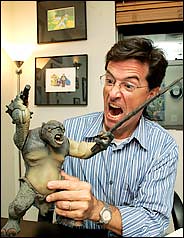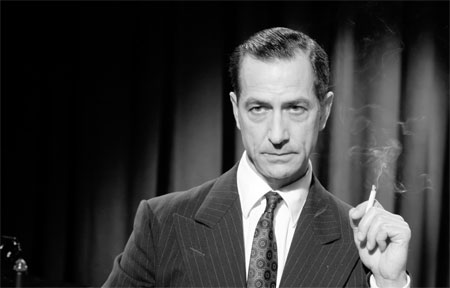A day after a report by the Inspector General on his tenure (and his questionable use of agency money), Kenneth Tomlinson, he of the axe to grind with Bill Moyers, resigns as chairman of the Corporation for Public Broadcasting. “Jeffrey Chester, executive director of the Center for Digital Democracy, an advocacy group, said: ‘It was time that Mr. Tomlinson stepped down. He has engaged in unethical, if not illegal, behavior.’” But don’t jump for joy just yet, Buster: Even with Tomlinson gone, conservatives still rule the roost at CPB.
Category: Media
Let the Gravitas Begin.

“No, this program is dedicated to you, the heroes!…And who are the heroes? The people who watch this show — average, hardworking Americans. You’re not the elites, you’re not the country club crowd. I know for a fact that my country club would never let you in. But you get it! And you come from a long line of it-getters!” Reviews come in grippy for the first installment of The Colbert Report, Comedy Central’s answer to The O’Reilly Factor. His opening monologue (at the official site) is well-worth watching.
MillerTimes.
“Greg Mitchell, who edits Editor & Publisher, writes, ‘Miller did far more damage to her newspaper than did Jayson Blair, and that’s not even counting her WMD reporting, which hurt and embarrassed the paper in other ways.’ Jay Rosen concurs. ‘There’s no question,’ he says, ‘this is bigger than Jayson Blair.'” Salon‘s Farhad Manjoo deconstructs the NY Times coverage of Judy Miller’s involvement in Plamegate (available here), and explains why Cheney chief Lewis Libby, in particular, may now be facing an obstruction of justice charge. If it’s any consolation, Scooter, Rove’s in hot water, too.
Exhuming McCarthy.

While perhaps a bit too black-and-white in terms of the history, George Clooney’s Good Night, and Good Luck is nevertheless a somber and captivating paean to Edward R. Murrow, his televised expose of Joe McCarthy, and, by extension, the Pioneer Days of Television Journalism. (In this last regard, it’s somewhat reminiscent of the excellent Clooney-produced live TV version of Fail Safe a few years ago.) It’s also assuredly a smoother, subtler, and more accomplished bit of muckraking than, say, Tim Robbins’ recent and lamentably over-the-top Embedded. Once again displaying the surprisingly strong directorial sense he exhibited in Confessions of a Dangerous Mind, Clooney also benefits here from a smartly written script which refuses to talk down to its audience, the crisp black-and-white cinematography, and quality performances across the board. As a result, what could have been an above-average History Channel documentary is instead a powerful and intelligent work of cinema that’s easily one of the better films out this year.
Admittedly, as Jack Shafer pointed out in Slate, Good Night, and Good Luck is rather narrowly focused, and works better as an impassioned and articulate morality play than it does as sound history. The Murrow of this film is saintly to a fault (although David Straitharn ameliorates this with a sardonic and multifaceted performance that may well get some nods come award time.) And there’s very little historical context offered herein, either for the origins of the McCarthy hysteria or for the Wisconsin Senator’s ultimate downfall, which had more to do with picking a fight with the army than with the Murrow broadcast.
That being said, I really like the way Clooney uses archival footage in this film. For one, Clooney was clever to follow Murrow’s example and let Joe McCarthy hoist himself on his own petard. Having the real McCarthy excoriate Murrow as the “leader of the jackal pack” gives the film a sense of history (and menace) that an actorly turn couldn’t have provided. For another, Clooney, who definitely appears to have done his homework, is unafraid to cut to real historical footage — the Annie Lee Moss hearings, for example — for extended periods, and just let the inherent drama of the real proceedings speak for itself. As a result, the history feels alive and contemporary, no mean feat when so many other historical films seem to use the past as merely exotic window dressing. Could the film have been more nuanced in its appraisal of both Murrow and McCarthyism? Undoubtedly. (Then again, nuanced appraisals weren’t exactly McCarthy’s strong point, either., nor is it a long suit of his current defenders.) But on the whole, Good Night, and Good Luck is, I think, a worthy exercise in historical filmmaking, and one with some obvious relevance in light of today’s entertainment-addled, sideshow-obsessed news media.
Movie-wise, there are a few small problems. I think the GN, & GL should have done either more or less with Robert Downey, Jr. and Patricia Clarkson as Wershbas Joe and Shirley — their particular plight doesn’t tie in to the rest of the story very well. And, while Ray Wise is good as the broadcaster-at-wits-end Don Hollenbeck, he’s also typecast in my mind — I kept expecting him to break into the Leland Palmer dance. All in all, though, Good Night, and Good Luck manages to enliven both the staid television studios of Fifties CBS and this historical moment with smoky jazz, languishing cigarettes, and ominous shadows. As the show says, see it now.
Dubya and Katrina.
By way of Breaching the Web and Medley, the Hurricane Katrina timeline. Think My Pet Goat extended over several days. Nevertheless, the GOP is rallying around Dubya: “Just 17 percent of Democrats said they approved of the way Bush was handling the Katrina crisis while 74 percent of Republicans said they approved.” Update: Out of sight, out of mind? Update 2: The Post‘s Terry Neal has more. Update 3: The government backs down on the media blackout after threat of a lawsuit by CNN.
In the Crossfire.
“The self-described ‘prince of darkness’ appears blinded by the light. He cannot see himself as everyone else does. He has called so much attention to himself that he casts no shadow at all. He is completely exposed.” Sidney Blumenthal puts the skewers to Bob Novak.
Signing off.
Just Let it Go.
Hey…still busy over on this end with the textbook project. At this point, I’m about ready to up and pull a Novak, but, fortunately, the end is in sight.
A Second Spitter?
Ok, the whistleblower defense wasn’t really cutting it for Karl…so, what’s next? Well, the new GOP talking point seems to be “Novak outed Plame first.” So, if true, does this get Rove off the hook? Not hardly. As both Salon‘s Tim Grieve and Slate‘s Tim Noah explain more eloquently, confirming Plame’s identity to Novak is still a big-time offense (as is passing it on to TIME‘s Matt Cooper.) But, this does mean that Novak had a second source among Dubya’s “senior administration” officials. Ari Fleischer, perhaps?
Judging Judy.
“It’s not necessarily clear that a press engaged in a tabloid-esque race to the bottom, consumed by sensationalist pseudo-stories, nuggets of McNews and flag-waving rhetoric, is a free press in any meaningful sense of the term,” writes Salon‘s Andrew O’Hehir in a thoughtful piece on the Judith Miller case. But, he concludes, “[c]ompelling a reporter to reveal his or her sources to the police turns that reporter into a police agent, and that’s not acceptable, even in unsavory circumstances like these.” Update: Salon readers poke some substantial holes in O’Hehir’s argument. Update 2: O’Hehir responds.
As a counterpoint, Slate‘s Jacob Weisberg argues the following: “To Miller and the Times, confidentiality is the trump value of journalism, one that outweighs all other considerations, including obedience to the law, the public interest, and perhaps even loyalty to country. This is indeed a strong principle, but it is a misguided one. In the Mafia, keeping confidences is the supreme value. In journalism, the highest value is the discovery and publication of the truth.“
And one more view by way of James Fallows, who’s written quite a bit on journalistic ethics in his time: “So Time Inc’s Norman Pearlstein says he will turn over Matthew Cooper’s notes, because Time magazine is ‘not above the law.’…Matt Cooper, Judith Miller, and the New York Times have been saying something completely different. They have been saying that there is a conflict between what the law asks and what their professional values allow them to do. Therefore they will take the consequences. They will go to jail….They are not placing themselves above the law. They are saying that certain values matter more to them than doing what the law now (outrageously, in my view) asks them to do. Norman Pearlstein is a smart man. Can he really have missed this point? Or is he acknowledging that another set of values have come to count for more, in large-scale corporate-owned journalism?“
